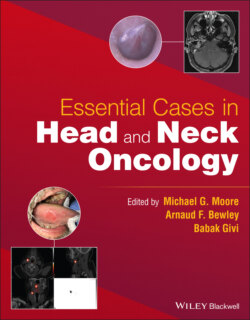Читать книгу Essential Cases in Head and Neck Oncology - Группа авторов - Страница 67
Key Points
ОглавлениеSurgical treatment of oropharyngeal carcinoma is appropriate in patients with transorally accessible early‐stage cancers without pathologically concerning features and no more than one ipsilateral lymph node.
Surgical treatment of oropharyngeal carcinoma can be done through transoral traditional, laser and robotic techniques. Patient factors such as trismus or having a narrow mandible or torus mandibularis may limit exposure. Moreover, a retropharyngeal internal carotid artery is a contraindication for transoral surgery for tumors involving the palatine tonsils.
Patients with obvious indications for postoperative chemoradiation should be given strong consideration for treatment with nonsurgical means to avoid trimodality therapy and reduce treatment burden.
Ipsilateral versus bilateral neck dissection depends on the location of the oropharyngeal tumor. Tumors limited to the palatine tonsil can be managed with ipsilateral dissection, whereas base of tongue cancers or those with significant soft palate extension should be considered for bilateral treatment.
